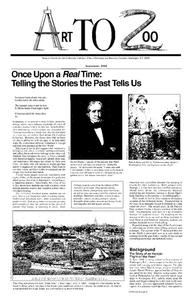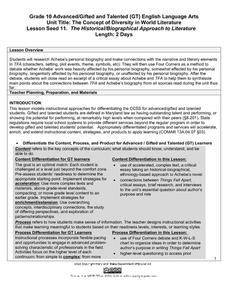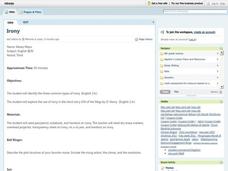Curated OER
Anolis Lizards of the Greater Antilles
Students "take a trip" to the Greater Antilles to observethe Anolis lizards. They study the body structures and habitat of different species, then plot this data on a map to look for patterns in their distribution. From the patterns they...
Curated OER
Telling the Stories the Past Tells Us
Students create historical stories based on factual evidence. In this Telling the Stories the Past Tells Us lesson, students write historical stories using strategies such as characters, plot, setting, and voice. Students analyze several...
Curated OER
Focus Story: The Mitten
Students explore language arts by analyzing a story with their classmates. In this poetry identification lesson, students read the book The Mittens and identify the characters, plot and settings in the story. Students recite poems about...
Curated OER
Folktales Reflect Daoist and Buddhist Traditions
Tenth graders compare three Chinese folktales for their "messages" and literary techniques to see how they reflect Chinese Confucian and Taoist values. They discuss how folktales share certain subjects, characters, plots and themes.
Curated OER
Create a Book with Student Treasures
You can't publish a story until after it has been revised and edited! Budding authors investigate the writing process while drafting an original story. They select a topic, complete a rough draft, edit it, revise it, and finally publish...
Curated OER
Writing a Fictional Narrative
Fourth graders write a fictional narrative using the computer. They can use files to help them focus on including a beginning, middle and end, characters, setting and plot or planning a story by answering questions.
Curated OER
Knights of the Round Table adapted by Gwen Ross
Everyone loves the tales involving King Arthur and his knights. After reading Knights of the Round Table by Gwen Gross, learners draw inferences and conclusions, analyze story elements, and discuss figurative language, including...
Curated OER
The Nature of the Antagonist
Students explain the differences between protagonists and antagonists and recognize the fundamental purpose of an antagonist or villain in storytelling. They also explain conflict as used in literature.
Curated OER
Conflict
Students outline the action in their narrative writing assignments by brainstorming about conflict. In this conflict analysis lesson, students define conflict and discuss the different types of conflict. Students brainstorm about a...
Alabama Learning Exchange
Interactive Reading Project
Young scholars discuss books they are reading during the semester through e-mail with other students. They complete a reading interest survey, e-mail their partner weekly, and read and suggest six novels by the end of the semester.
Curated OER
Great Expectations: Group Writing
Examine the differences between totalitarianism and democracy in this writing lesson. Using the same format and theme from Great Expectations, young writers work in pairs to compose their own short stories. They follow guidelines for the...
Curated OER
Pride and Prejudice
Help your class recognize classic literature with universal themes. They will demonstrate their familiarity with Pride and Prejudice by updating a selected scene from it to the 21st century. Tip: Bring in a modern movie clip that shows...
Curated OER
The Power of Fiction
Students explore fiction that moves individuals to social action. For this literature lesson, students read The Jungle by Upton Sinclair and analyze its literary worth as well as its investigative journalism. Students investigate other...
Curated OER
What is a Fable?
Students read a variety of electronic Aesop's fables to define fable and moral, and write and illustrate an original fable. They then publish their fable using PowerPoint.
Carnegie Library
Creative Writing: Middle School Lesson Plan
Enhance a unit on historical fiction with an engaging writing lesson. Learners bring the Industrial Era to life as they compose their own historical fiction pieces based on primary source images of Pittsburgh steel workers.
Maryland Department of Education
The Concept of Diversity in World Literature Lesson 11: The Historical/Biographical Approach to Literature
How affected is Thinks Fall Apart by Chinua Achebe's personal biography? Using a four corners strategy, and evidence from their readings, class members debate the degree of biographical influence in Achebe's novel.
Museum of Tolerance
Immigration Journeys
Through the journey of four stories of immigration, scholars complete graphic organizers and apply knowledge to create a visual representation of their findings on a large poster. Third and fourth readers write a letter to their...
Curated OER
Compare and Contrast: Literary Analysis
Great for a reading intervention or remedial Language Arts class, this lesson uses two stories from Chicken Soup for the Teenage Soul III ("Terri Jackson" and "Mary Lou" to reinforce note-taking skills, story elements, and comparing and...
Curated OER
Telling a Story
Do your class members complain they don’t know what to write about? Give them disposable cameras and ask them to take pictures of 12 things that make them happy. After the pictures are developed, they are pasted on a poster board and...
Curated OER
Fairy Tales Retold
Students use writing processes effectively to adapt and retell stories. They reread a favorite fairy tale, then adapt and retell in a PowerPoint or other multimedia presentation. They present their rewritten and edited presentations to...
Curated OER
Irony
What are the three types of irony? High schoolers engage in a lesson about the use of irony while reading O.Henry's short story "Gift of the Magi." They'll discuss rising action, climax, and resolution in the text before highlighting the...
Curated OER
Literary Analysis of The Minister's Black Veil
After reading The Minister's Black Veil, by Nathaniel Hawthorne as a homework assignment your class will complete a literary analysis. Learners will analyze important element of the story and take notes to help support their...
Hawaiʻi State Department of Education
ABA Form in Music
Patterns happen everywhere, in music, math, and language! Fourth graders listen to the "William Tell Overture" visualizing the patterns that they hear. They then discuss and write an ABA poem that matches the ABA form found in the music...
Curated OER
Author In The Spotlight
Complete an in-depth study of the works or a specific author. Working in pairs, students read at least four works by the same author. After completing the reading, they create an essay comparing and contrasting the works and create an...























